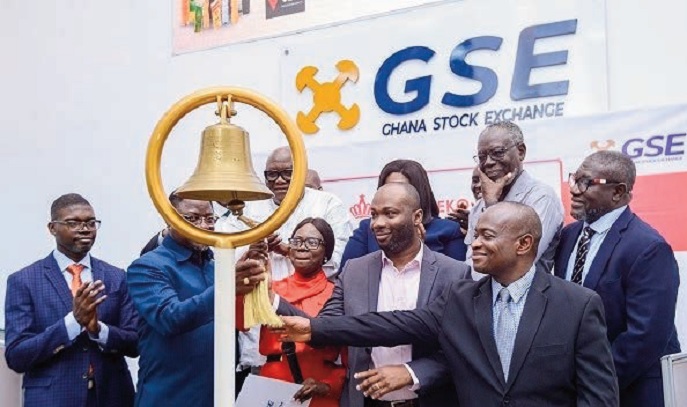
The Chief Executive Officer of Kasapreko Company Limited, Richard Adjei, has hinted at expanding the indigenous company’s product portfolio into the food industry, while utilising the African Continental Free Trade Agreement (AfCFTA) fully to deepen its footprint across the continent.
“I believe that coming onto the equity market gives us access to bigger and more patient funds to expand within the sub-region,” Managing Director Kasapreko Richard Adjei said during a ‘Facts Behind the Figures’ session organised by Ghana Stock Exchange (GSE).
Hoping to capitalise on the AfCFTA one market to increase Kasapreko’s production and market share, Adjei stressed: “We cannot always produce in Ghana and export. We want to set up factories in other countries to serve those markets.
“We are looking at expanding our product portfolio into the food industry over the next 10 years,” he shared.
The beverages manufacturer’s export volumes surged by 83 percent in the last two years, with 25 percent of 2024’s total revenue raked in from the international market.
The company’s presence is spread across the African continent, with its largest markets in the west African market – Ivory Coast, Togo, Burkina Faso and Nigeria – as well as East and Southern Africa.
This announcement follows a stellar performance in the 2024 financial year and Q1-2025 – and a successful issuance of GH¢350million corporate bonds on the Ghana Fixed Income Market (GFIM).
“Our entry into the debt capital market was more than a financing move, it was a bold statement,” Adjei said.
“We embraced accountability, demonstrated strong governance and proved that a homegrown Ghanaian brand can excel under public scrutiny while delivering value to investors,” he noted.
Kasapreko’s revenue grew by 45 percent in 2024, taking the total revenue posted for the year to GH¢2.7billion. Profit after tax also surged from GH¢20.4million in 2023 to GH¢137.7million in 2024, which represents a year-on-year growth of 574 percent.
According to management, this remarkable growth was driven by strong domestic sales and rising demand in export markets.
Due to improved operational efficiency, sustained volume growth and disciplined cost management, the momentum continued into 2025.
Kasapreko reported a net profit of GH¢47.2million in the first quarter of 2025 compared with the GH¢16.6million recorded same period last year. Revenue also increased by 52 percent year-on-year.

Against this impressive performance, Adiei disclosed that the company is set to list on the main market of Ghana Stock Exchange by year- end with an IPO, floating 25 percent of its shares and opening the door for public ownership.
Adiei noted that the IPO forms part of a broader strategy to optimise the company’s capital structure for growth and market diversification.
“This will allow us to deepen stakeholder engagement and broaden our access to long-term capital,” Mr. Adjei said. Managing Director-GSE Abena Amoah commended the remarkable leap in the company’s financials, while elaborating on privileges within the capital market.
“We assist you to withstand economic shocks, diversify risks and take advantage of capital markets,” she noted.
She welcomed Kasapreko’s bold move to list on the stock market.
“This is a significant development for Ghana’s capital market. We are optimistic that this will encourage more large companies, including state-owned enterprises, to consider listing,” Ms. Amoah said.
She expressed the exchange’s commitment to assisting businesses in Ghana access long-term ‘patient’ capital and good governance to support business growth, create jobs and support economic growth.
The GSE Composite Index has recorded a four-week gain of 7.92 percent and a year-to-date increase of 33.39 percent. Market capitalisation stood at GH¢143billion, representing a 70 percent rise from what was recorded same period last year. On the fixed income market, volume has risen to GH¢87billion from GH¢57billion recorded in the same period last year.
The post Kasapreko records GH¢47.2m profit in Q1-2025 appeared first on The Business & Financial Times.
Read Full Story























Facebook
Twitter
Pinterest
Instagram
Google+
YouTube
LinkedIn
RSS